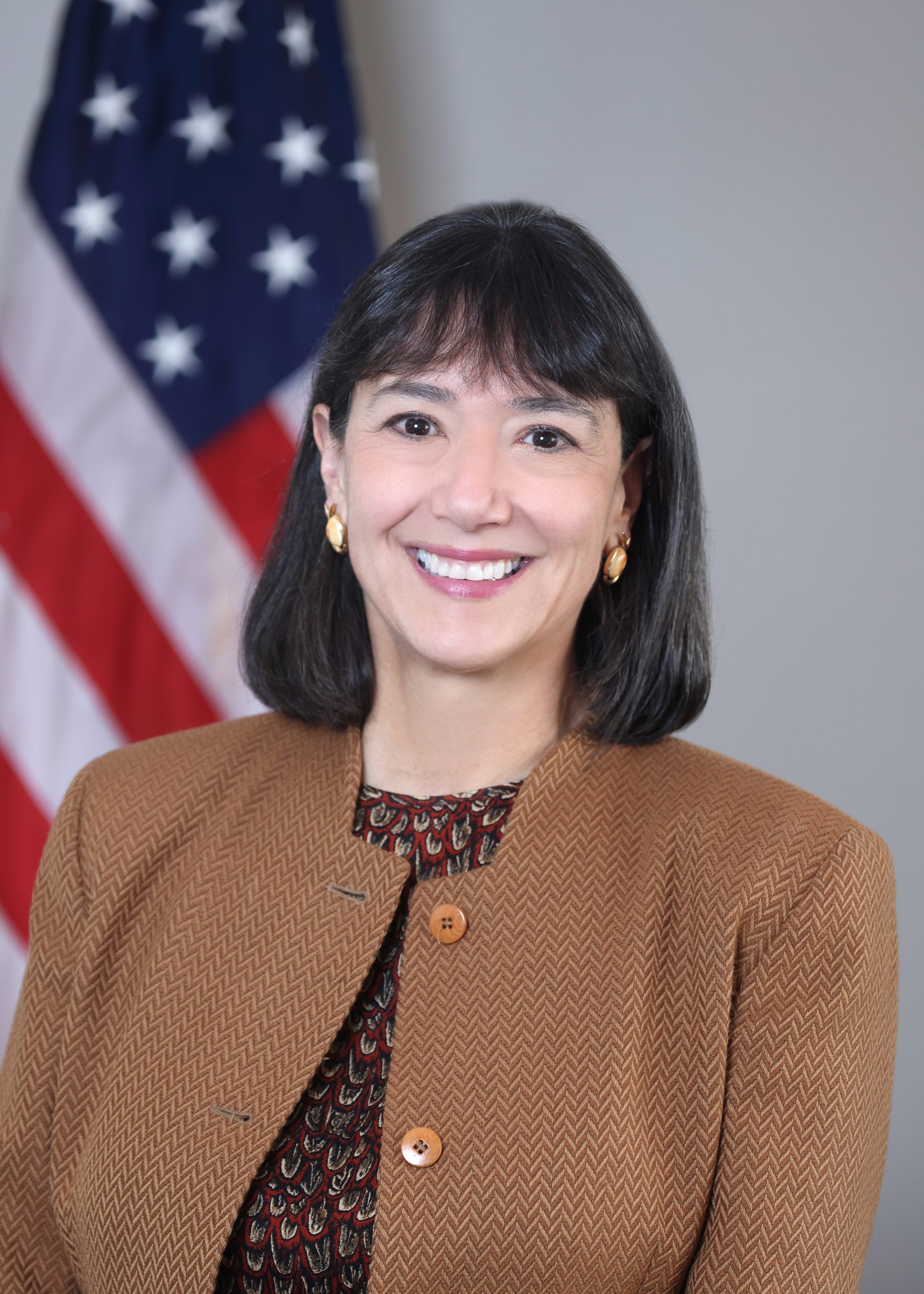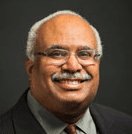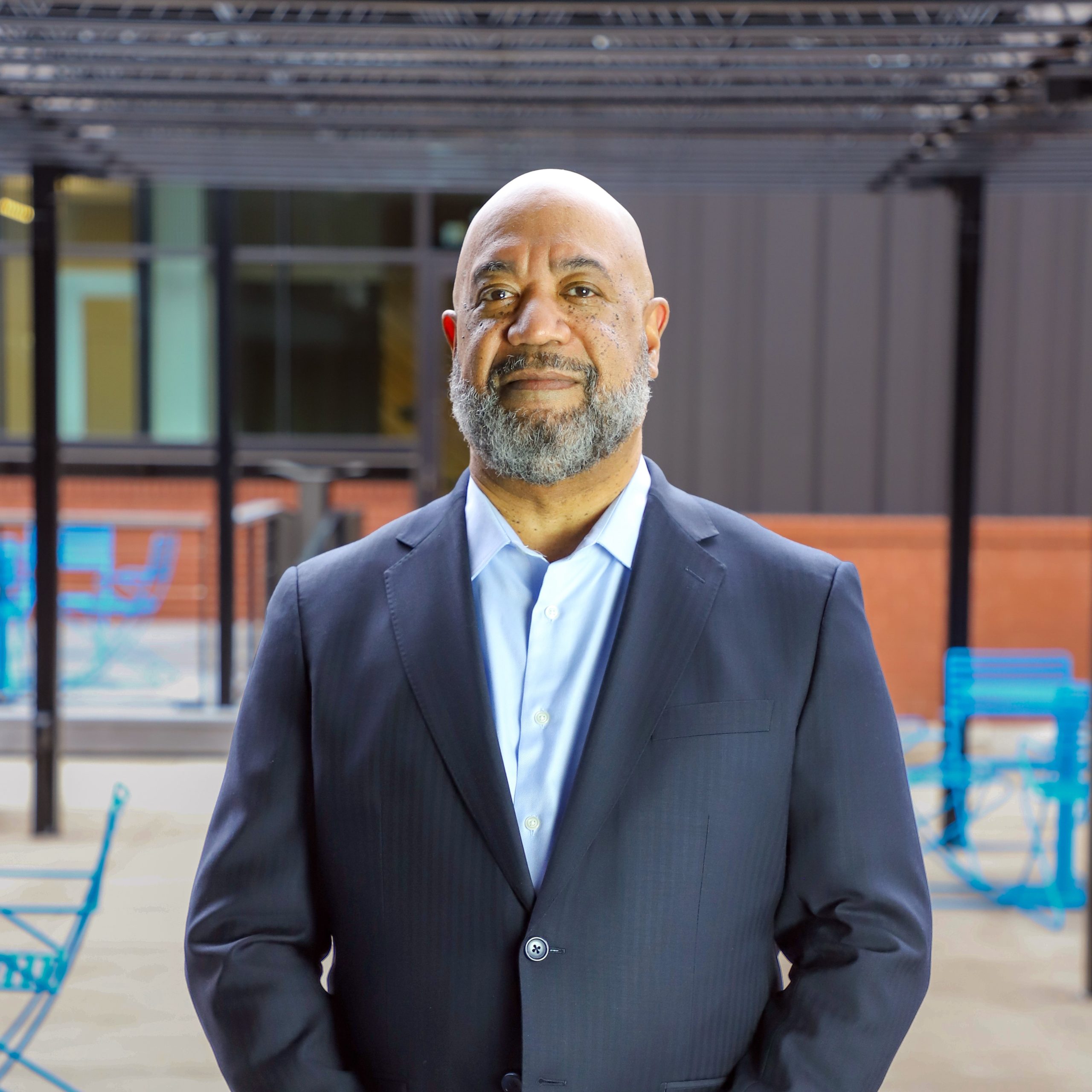Leadership Consortium Members
Leadership

Monica M. Bertagnolli, MD, was the 17th director of the National Institutes of Health (NIH). She was nominated by President Joe Biden on May 15, 2023, confirmed by the U.S. Senate on November 7, 2023, and took office on November 9, 2023. She is the first surgeon and second woman to hold the position. As the NIH Director, Dr. Bertagnolli oversaw the work of the largest funder of biomedical and behavioral research in the world. She previously served as the 16th director of the National Cancer Institute (NCI), the Richard E. Wilson Professor of Surgery in surgical oncology at Harvard Medical School, a surgeon at Brigham and Women’s Hospital and a member of the Gastrointestinal Cancer Treatment and Sarcoma Centers at Dana-Farber Cancer Institute.
Throughout her career, Dr. Bertagnolli has been at the forefront of the field of clinical oncology. Her laboratory focused on advancing our understanding of the genetic drivers of gastrointestinal cancer development and the role of inflammation as a promoter of cancer growth. As a physician–scientist, she led translational science initiatives from 1994 to 2011 within the NCI-funded Cooperative Groups Program (now known as NCI’s National Clinical Trials Network), and from 2011–2022 served as group chair of the Alliance for Clinical Trials in Oncology, a National Clinical Trials Network member organization. In addition, from 2007–2018, she served as the chief of the division of Surgical Oncology for the Dana-Farber Brigham Cancer Center.
Dr. Bertagnolli has championed collaborative initiatives to transform the data infrastructure for clinical research and is the founding chair of the minimal Common Oncology Data Elements (mCODE) executive committee. She also is a past president and chair of the board of directors of the American Society of Clinical Oncology and has served on the board of directors of the American Cancer Society and the Prevent Cancer Foundation. In 2021, she was elected to the National Academy of Medicine, having previously served on the National Academies National Cancer Policy Forum.
The daughter of first-generation Italian and French Basque immigrants, Dr. Bertagnolli grew up on a ranch in southwestern Wyoming. She graduated from Princeton University with a Bachelor of Science in Engineering degree and attended medical school at the University of Utah. She trained in surgery at Brigham and Women’s Hospital and was a research fellow in tumor immunology at the Dana-Farber Cancer Institute.

Mark McClellan, MD, PhD, is Director and Robert J. Margolis, M.D., Professor of Business, Medicine and Policy at the Duke‐Margolis Institute for Health Policy at Duke University. He is a physician‐economist who focuses on quality and value in health care including payment reform, real‐world evidence and more effective drug and device innovation. At the center of the nation’s efforts to combat the COVID‐19 pandemic, the author of COVID‐19 response roadmap, and co‐author of a comprehensive set of health policy strategies for COVID vaccines, testing, and treatments, Dr. McClellan and his Duke‐Margolis colleagues are now focused on health policy strategies and solutions to advance the resilience and interconnectedness of 21st Century public health and health care. He is a former administrator of the Centers for Medicare & Medicaid Services and former commissioner of the U.S. Food and Drug Administration where he developed and implemented major reforms in health policy. Dr. McClellan is an independent board member on the boards of Johnson & Johnson, Cigna, Alignment Healthcare, and PrognomIQ; co‐chairs the Guiding Committee for the Health Care Payment Learning and Action Network; and serves as an advisor for Arsenal Capital Group, Blackstone Life Sciences.
Current Members

Amy Abernethy, M.D., Ph.D., is cofounder of Highlander Health, an organization focused on advancing evidence generation for the new era of medical innovation. As an oncologist, serial entrepreneur, and standard setter, Dr. Abernethy is a champion for speeding the pace at which safe and effective treatments reach patients, and for progressive and responsible use of our healthcare system’s data.
Dr. Abernethy is the former principal deputy commissioner of the U.S. Food and Drug Administration. While there, Dr. Abernethy led initiatives in advancing clinical evidence generation and personalized healthcare and also served as the agency’s acting chief information officer.
More recently, Dr. Abernethy served as chief medical officer and president of product development at Verily, Alphabet’s precision health business, leading the company’s development and delivery of solutions that connect clinical research and care. Earlier roles include that of Flatiron Health’s first chief medical officer and chief scientific officer, as well as: professor of medicine at Duke University School of Medicine; director of the Center for Learning Health Care at the Duke Clinical Research Institute; and, director of the Duke Cancer Care Research Program at the Duke Cancer Institute. An avid learner and teacher, and a hematologist/oncologist and palliative medicine physician, Dr. Abernethy has authored over 500 publications.

Shantanu Agrawal is the Chief Health Officer of Anthem, Inc. Dr. Agrawal oversees Anthem’s enterprise health strategy, to include medical policy and clinical quality, as well as the company’s industry-leading work to address the social drivers of health. He will also lead Anthem’s community health strategy and the Anthem Foundation.
Dr. Agrawal most recently served as President and Chief Executive Officer of the National Quality Forum (NQF), a non-profit organization dedicated to working with members of the healthcare community to drive measurable health improvements. He is also the former Deputy Administrator for the Centers for Medicare & Medicaid Services (CMS), where he led an effort to improve the physician experience with Medicare and was also was one of the main architects of CMS’s strategy to address the national opioid epidemic. Dr. Agrawal also served as Director of the Center for Program Integrity (CPI), where he was instrumental in launching new initiatives in data transparency and analytics, utilization management and payment models.
Dr. Agrawal serves on the board of the Grameen Foundation and the Presidential Advisory Council of Brown University’s School of Public Health. He is also Adjunct Senior Fellow at the Leonard Davis Institute of Health Economics at the University of Pennsylvania and Associate Clinical Professor of Emergency Medicine at the George Washington University School of Medicine.
Dr. Agrawal completed his undergraduate education at Brown University, medical education at Weill Medical College of Cornell University, and clinical training in Emergency Medicine at the Hospital of the University of Pennsylvania. He earned his master’s degree in Social and Political Sciences from Cambridge University.


Dr. Balser undertook residency training in anesthesiology and fellowship training in cardiac anesthesiology and in critical care medicine at The Johns Hopkins Hospital in Baltimore, MD. He joined the faculty at Johns Hopkins in 1995, where he practiced cardiac anesthesiology, ICU medicine, and led an NIH-funded research program aimed at the genetics of cardiac rhythm disorders, such as sudden cardiac death.
He returned to Vanderbilt in 1998 as Associate Dean for Physician Scientist Development, and soon was appointed Chair of the Department of Anesthesiology, directing one of the medical center’s largest clinical service programs. He became the Medical Center’s chief research officer in 2004, leading a period of scientific expansion that moved the Medical Center into the nation’s top 10 in NIH funding, launching big-science programs integrating health informatics and genomics that stimulated the Medical Center’s national leadership in personalized medicine.
In 2008 he was elected to the National Academy of Medicine, and later that year was named the eleventh dean of Vanderbilt’s School of Medicine since its founding in 1875. In 2009, he was also named Vice Chancellor for Health Affairs with executive responsibility for all health-related programs including the hospitals, clinics, research programs, and the medical and nursing schools. He has led the Medical Center through a period of marked service-volume growth with major inpatient expansions of the children’s hospital and the adult critical care areas, bolstered by 4% compound annual growth of outpatient visits (over 2.1 million per year), and by the creation of region’s largest, multi-state provider-led network (over 50 hospitals and 3000 clinicians: the Vanderbilt Health Affiliated Network).
In 2013-2014, he led a $230 million (8%) cost reduction across all mission areas, improving the Medical Center’s competitive position in a rapidly evolving price-sensitive marketplace. In coordination with the Vanderbilt Chancellor and Board of Trust, Dr. Balser has led the Medical Center through a restructuring process that concluded April 30, 2016, placing its clinicians, hospitals, clinics, research and graduate medical education programs into a financially distinct not-for-profit corporation, Vanderbilt University Medical Center (VUMC). As President and CEO of VUMC, he reports to an independent board of directors, while also serving as dean of the Vanderbilt University School of Medicine.

Georges Benjamin, MD, is known as one of the nation’s most influential physician leaders because he speaks passionately and eloquently about the health issues having the most impact on our nation today. From his firsthand experience as a physician, he knows what happens when preventive care is not available and when the healthy choice is not the easy choice. As executive director of APHA since 2002, he is leading the Association’s push to make America the healthiest nation in one generation. He came to APHA from his position as secretary of the Maryland Department of Health and Mental Hygiene. Benjamin became secretary of health in Maryland in April 1999, following four years as its deputy secretary for public health services. As secretary, Benjamin oversaw the expansion and improvement of the state’s Medicaid program.
Benjamin, of Gaithersburg, Maryland, is a graduate of the Illinois Institute of Technology and the University of Illinois College of Medicine. He is board-certified in internal medicine and a fellow of the American College of Physicians, a fellow of the National Academy of Public Administration, a fellow emeritus of the American College of Emergency Physicians and an honorary fellow of the Royal Society of Public Health.
An established administrator, author and orator, Benjamin started his medical career in 1981 in Tacoma, Washington, where he managed a 72,000-patient visit ambulatory care service as chief of the Acute Illness Clinic at the Madigan Army Medical Center and was an attending physician within the Department of Emergency Medicine. A few years later, he moved to Washington, D.C., where he served as chief of emergency medicine at the Walter Reed Army Medical Center. After leaving the Army, he chaired the Department of Community Health and Ambulatory Care at the District of Columbia General Hospital. He was promoted to acting commissioner for public health for the District of Columbia and later directed one of the busiest ambulance services in the nation as interim director of the Emergency Ambulance Bureau of the District of Columbia Fire Department.
At APHA, Benjamin also serves as publisher of the nonprofit’s monthly publication, The Nation’s Health, the association’s official newspaper, and the American Journal of Public Health, the profession’s premier scientific publication. He is the author of more than 100 scientific articles and book chapters. His recent book The Quest for Health Reform: A Satirical History is an exposé of the nearly 100-year quest to ensure quality affordable health coverage for all through the use of political cartoons.
Benjamin is a member of the National Academy of Medicine (Formally the Institute of Medicine) of the National Academies of Science, Engineering and Medicine and also serves on the boards for many organizations including Research!America and the Reagan-Udall Foundation. In 2008, 2014 and 2016 he was named one of the top 25 minority executives in health care by Modern Healthcare Magazine, in addition to being voted among the 100 most influential people in health care from 2007-2017.
In April 2016, President Obama appointed Benjamin to the National Infrastructure Advisory Council, a council that advises the president on how best to assure the security of the nation’s critical infrastructure.

Joseph Betancourt is the president of the Commonwealth Fund. One of the nation’s preeminent leaders in health care, equity, quality, and community health, Betancourt formerly served as the senior vice president for Equity and Community Health at Massachusetts General Hospital (MGH), overseeing the organization’s diversity, equity, inclusion, and community health portfolio, including its Center for Diversity and Inclusion, Disparities Solutions Center, Center for Community Health Improvement, and centers focused on gun violence prevention, community health innovation, immigrant health, and global health. Previously, Betancourt led the Mass General Brigham (MGB) system’s COVID Equity and Community Health response and served as Vice President and Chief Equity and Inclusion Officer at MGH, where he helped develop and launch the organization’s Structural Equity Ten-Point Plan and MGB’s United Against Racism Initiative. As director of MGH’s Disparities Solutions Center, which he founded, Betancourt worked to develop the capacity of health care organizations to improve quality, address disparities, and achieve equity. The center’s Disparities Leadership Program worked with more than 350 operating health care systems across the country, providing guidance on how they can improve quality and value in the care of diverse, minority, and vulnerable populations.



Wyatt Decker, M.D., MBA, is UnitedHealth Group’s Executive Vice President and Chief Physician, value-based care. In this role, Dr. Decker serves as the company’s lead ambassador for value-based care, working across the enterprise and externally with key stakeholders to further enable and advance accountable models of care.
Dr. Decker previously served as Chief Executive Officer of Optum Health, UnitedHealth Group’s national integrated care delivery platform. During his nearly five-year tenure, he played a vital role in building out and accelerating Optum Health’s value-based care delivery capabilities and helping over 100,000 employed and contracted physicians achieve lower costs and deliver better outcomes for more than 100 million people – including the nearly 4 million people Optum now serves in fully accountable, value-based arrangements. Under his leadership, Optum Health established national platforms for care delivery, home and community care, behavioral care, benefits chronic disease management solutions, and the Center for Advanced Clinical Solutions, applying cutting-edge technologies to solve some of health care’s toughest problems.
Prior to joining Optum, Dr. Decker served as CEO of Mayo Clinic in Arizona. In that role he established Mayo Clinic in Arizona as the safest hospital in the United States, launched a state-of-the-art cancer center, the second campus of Mayo Clinic Alix School of Medicine and was acknowledged by U.S. News & World Report among the nation’s top 20 hospitals. At Mayo Clinic, Dr. Decker pioneered the use of digital technologies, including telemedicine and artificial intelligence, to deliver health care expertise to affiliated care providers nationwide, as well as led the digital strategy around engaging and empowering patients. Dr. Decker also served as the founding chair and professor of emergency medicine at the Mayo Clinic College of Medicine where he established and directed the emergency medicine residency training program.
Dr. Decker holds an M.D. from Mayo Clinic Alix School of Medicine, an MBA from Kellogg School of Management, Northwestern University, and a Bachelor of Science from University of California, Santa Cruz. He has published numerous scientific articles and is recognized among the nation’s top 100 health care leaders by Modern Healthcare.


Judy Faulkner is CEO and founder of Epic, which she began in 1979 in the basement of an apartment house with $70,000 in start-up money and 2 half-time assistants. Epic has grown by its bootstraps, without venture capital or going public.
Judy received honorary doctorates from the University of Wisconsin and from Mount Sinai in New York, an MS in Computer Science from the UW, and a BS in Mathematics from Dickinson College. After teaching computer science for several years she then worked as a software developer, creating one of the first databases organized around the patient.
Judy currently serves on the UW Computer Science Board of Visitors, is a member of the National Academy of Medicine’s Leadership Roundtable and of the Aspen Health Strategy Group. She has pledged that 99% of her assets will go to philanthropy.

Dr. Julie Gerberding is Executive Vice President and Chief Patient Officer, Strategic Communications, Global Public Policy, and Population Health at Merck & Co., Inc., where she also has responsibility for the Merck for Mothers program and the Merck Foundation. As Chief Patient Officer, Dr. Gerberding leads efforts to engage with patients and patient organizations to bring their perspectives into Merck and MSD to help inform company decisions and represents Merck globally on patient-related matters. In addition, she is building new initiatives designed to accelerate Merck’s ability to contribute to improved population health, a measure increasingly valued by consumers, health organizations, and communities.
As a world-renowned infectious disease and public health expert, Dr. Gerberding is a leader well-versed in and passionate about acting with purpose and urgency to meet patient needs. She joined Merck in January 2010 as president of Merck Vaccines and, during her leadership of that business, helped make the company’s vaccines increasingly more available and affordable to people in emerging markets and some of the most resource-limited countries in the world. Dr. Gerberding also helped lead the successful launch in India of the MSD Wellcome Trust Hilleman Laboratories, a not-for-profit joint venture for vaccine development. In 1998, she left her tenured academic faculty appointment at the University of California, San Francisco, to lead the U.S. Centers for Disease Control and Prevention (CDC) Division of Healthcare Quality Promotion and then served as the CDC Director from 2002 to 2009.
As director, Dr. Gerberding led the CDC through more than 40 emergency responses to public health crises, including anthrax bioterrorism, SARS, and natural disasters. She also advised governments around the world on urgent issues such as pandemic preparedness, AIDS, antimicrobial resistance, tobacco, and cancer. At the University of California, San Francisco (UCSF), Dr. Gerberding directed the Prevention Epicenter, a multidisciplinary research, training, and clinical service program that focused on the prevention of infections in patients and their healthcare providers.
Dr. Gerberding received her undergraduate and M.D. degrees from Case Western Reserve University (CWRU). She completed her internship and residency in Internal Medicine and fellowship in Clinical Pharmacology and Infectious Diseases at the University of California, San Francisco (UCSF), where she is currently an Adjunct Associate Clinical Professor of Medicine in Infectious Diseases. Dr. Gerberding received a Masters of Public Health at the University of California, Berkeley. She is a member of the Institute of Medicine and a fellow of the Infectious Diseases Society of America and the American College of Physicians, and is board certified in Internal Medicine and Infectious Diseases.
Dr. Gerberding currently serves on the Boards of Cerner Corporation, CWRU, MSD Wellcome Trust Hilleman Laboratories, and the BIO Executive Committee. Dr. Gerberding has received more than 50 awards and honors, including the United States Department of Health and Human Services (DHHS) Distinguished Service Award for her leadership in responses to anthrax bioterrorism and the September 11, 2001 attacks. In 2018, she was selected as the Healthcare Businesswomen Association’s Woman of the Year and received the Lifetime Achievement Award from eyeforpharma. Previously, Dr. Gerberding was named to Forbes Magazine’s 100 Most Powerful Women in the World in 2005 through 2008 and to TIME Magazine’s 100 Most Influential People in the World in 2004.

Sandra R. Hernández, MD is president and CEO of the California Health Care Foundation. Prior to joining CHCF, Sandra was CEO of The San Francisco Foundation, which she led for 16 years. She previously served as director of public health for the City and County of San Francisco. She also co-chaired San Francisco’s Universal Healthcare Council, which designed Healthy San Francisco, an innovative health access program for the uninsured.
Sandra is an assistant clinical professor at the University of California, San Francisco, School of Medicine. She practiced at San Francisco General Hospital in the AIDS clinic from 1984 to 2016. She was appointed by Governor Jerry Brown to the Covered California board of directors in February 2018. She currently serves on the Betty Irene Moore School of Nursing Advisory Council at UC Davis and the UC Regents Committee on Health Services. Sandra served on the External Advisory Committee at the Stanford Center for Population Health Sciences in 2016. Sandra is a graduate of Yale University, the Tufts School of Medicine, and the certificate program for senior executives in state and local government at Harvard University’s John F. Kennedy School of Government.

Michelle Hood is the executive vice president and chief operating officer of the American Hospital Association. Previously she served as president and CEO of Northern Light Health, a Brewer, Maine-based, $1.8 B integrated health system providing services across the state of Maine. During 14 years in this role, she oversaw significant organic growth of the system as well as addition of three hospitals, four skilled-nursing facilities, a home-care agency, residential hospice services and numerous ground/air ambulance units. She also focused on healthcare policy and design models at the state and national levels, keenly aware of Northern Light’s need to succeed in a rapidly changing healthcare environment.
Prior to Maine, Hood served as the president and CEO of the Sisters of Charity of Leavenworth Health Systems, Montana Region, as well as president and CEO of the Region’s flagship hospital, St. Vincent Healthcare. Before coming to the AHA, she served on the Association’s Board of Trustees and Executive Committee and on the University of Maine System Board of Trustees.


Dr. Huang is currently Chief Science & Innovation Officer for Onduo by Verily, and Head of Clinical Informatics at Verily (Google’s life sciences subsidiary), and is now adjunct faculty at Duke. Dr. Huang’s research interests span applied machine learning, research provenance and data infrastructure. Projects include building data provenance tools funded by the NIH’s Big Data to Knowledge program, regulatory science funded by the Burroughs Wellcome Foundation. Applied machine learning applications include “Deep Care Management” a highly interdisciplinary project with Duke Connected Care, Duke’s Accountable Care Organization, that integrates claims and EHR data for predicting unplanned admissions and risk stratifying patients for case management; CALYPSO, a collaboration with the Department of Surgery for utilizing machine learning to predict surgical complications. My team is also building the data platform for the Department of Surgery’s “1000 Patients Project” an intensive biospecimen and biomarker study based around patients undergoing the controlled injury of surgery.
As Director of Duke Forge, Dr. Huang is working to build a data science culture and infrastructure across Duke University that focuses on actionable health data science. The Forge emphasizes scientific rigor, awareness that technology does not supersede clinicians’ responsibilities and human relationship with their patients, and the role of data science in society.


Peter Lee is President, Microsoft Research, at Microsoft. He leads Microsoft Research across its nine laboratories around the world. He also oversees several incubation teams for new research-powered lines of business, the largest of which today is Microsoft’s growing healthcare and life sciences effort. Dr. Lee has extensive experience in managing fundamental research to commercial impact in a range of areas, spanning artificial intelligence, to quantum computing, to biotechnology, and more. Before joining Microsoft in 2010, he was at DARPA, where he established a new technology office that created operational capabilities in machine learning, data science, and computational social science. From 1987 to 2005 he was a Professor at Carnegie Mellon University, and from 2005 to 2008 the Head of the university’s computer science department. Today, in addition to his management responsibilities, Dr. Lee speaks and writes widely on technology trends and policies. He is a member of the National Academy of Medicine. He serves on the Boards of Directors of the Allen Institute for Artificial Intelligence, the Brotman Baty Institute for Precision Medicine, and the Kaiser Permanente Bernard J. Tyson School of Medicine. In public service, Dr. Lee was a commissioner on President Obama’s Commission on Enhancing National Cybersecurity and led several studies for both PCAST and the National Academies on the impact of federal research investments on economic growth. He has testified before both the US House Science and Technology Committee and the US Senate Commerce Committee.

Kenneth D. Mandl, MD, MPH is a Professor at Harvard Medical School (HMS) and the Director at Boston Children’s Hospital Computational Health Informatics Program. Recognized for research and teaching, Mandl received the Presidential Early Career Award for Scientists and Engineers and the Clifford A. Barger Award for top mentors at Harvard Medical School. He was advisor to two Directors of the CDC and chairs the Board of Scientific Counselors of the NIH’s National Library of Medicine. Dr. Mandl has been elected to multiple honor societies including the American Society for Clinical Investigation, Society for Pediatric Research, American College of Medical Informatics and American Pediatric Society. Mandl leads two postdoctoral training programs in clinical and informatics research and directs the Population Health Track of the new Masters Degree in Biomedical Informatics at HMS. Mandl is a faculty member in the HMS Center for Biomedical Informatics and in the Division of Health Sciences and Technology at Harvard and MIT. Through scholarship intersecting epidemiology and informatics, Mandl pioneered use of IT and big data for population health, discovery, patient engagement and care redesign. Mandl leads the transformative SMART Platforms initiative to design the “app store for health” and is principal investigator of the Scalable Collaborative Infrastructure for a Learning Health System across Boston hospitals and nationally. Recognized for research and teaching, Mandl received the Presidential Early Career Award for Scientists and Engineers and the Clifford A. Barger Award for top mentors at Harvard Medical School. He was advisor to two Directors of the CDC and chairs the Board of Scientific Counselors of the NIH’s National Library of Medicine. His clinical training and experience is in pediatrics and pediatric emergency medicine. Dr. Mandl has been elected to multiple honor societies including the American Society for Clinical Investigation, Society for Pediatric Research, American College of Medical Informatics and American Pediatric Society.

Laura Mauri, MD, MSc, is the Senior Vice President, Chief Scientific and Medical Officer at Medtronic. Laura received her A.B. from Harvard College and her M.D. from Harvard Medical School, both magna cum laude, and her M.Sc. (Clinical Epidemiology) from Harvard School of Public Health. She completed residency in internal medicine and fellowships in cardiovascular disease and interventional cardiology at the Brigham and Women’s Hospital. Laura serves on the Board of directors of (MDIC) and is a member of the NIH Advisory Committee. She is a member of the American Society of Clinical Investigation, the Association of University Cardiologists, a Fellow of the American College of Cardiology, a Fellow of the American Heart Association and American College of Cardiology, and member of the Society of Cardiac Angiography and Intervention. She has authored approximately 200 original articles, served as a Senior Editor for the journal Circulation, and was awarded the Joseph A. Vita Award for Clinical Research by the American Heart Association in 2017.

Paul Minardi, MD, serves as executive vice president and CEO of the KP Medical Foundation. In this role, he oversees the KP Medical Foundation with accountability for integrating care delivery and driving higher quality through innovation, best practices, and standards in participating markets, which today include Colorado and Washington.
Dr. Minardi reports directly to Kaiser Permanente’s chair and chief executive officer and is a member of the National Executive Team.
Prior to becoming KP Medical Foundation CEO, Dr. Minardi was president and executive medical director of the Washington Permanente Medical Group, leading and advocating for the nationally recognized 1,300-clinician multispecialty group. Dr. Minardi also served as executive vice president of Finance and Strategy for The Permanente Federation — the national consortium representing the 8 Permanente Medical Groups and their 24,605 physicians — and as medical director of Business Management for the Southern California Permanente Medical Group. He has served on 3 Permanente Medical Group boards: Southern California Permanente Medical Group, The Southeast Permanente Medical Group, and Washington Permanente Medical Group.
Throughout his 38 years in medicine, he’s won many clinical and leadership awards and held numerous leadership positions. While at Kaiser Permanente Riverside Medical Center, he was the physician lead for population care, home care, quality, continuing care, risk, and inpatient utilization management, and he also oversaw its family medicine residency program. He also served as Member Services physician adviser and on the hospital executive committee.
Dr. Minardi played an integral role during the largest SCPMG physician and membership expansion, the introduction and growth of health and wellness programs, and the largest private deployment and optimization of electronic health records in the United States. He also helped introduce employer on-site clinics, the Kaiser Permanente retail clinic strategy with Target and CVS, the Kaiser Permanente traveling member program, as well as mobile health. He also served on the due diligence team for the Group Health Cooperative acquisition by Kaiser Permanente, which became Kaiser Permanente Washington.
A graduate of the Autonomous University of Guadalajara School of Medicine in Jalisco, Mexico, Dr. Minardi completed his Fifth Pathway at the University of California Irvine, School of Medicine, and then completed his residency in family medicine at Kaiser Permanente San Bernardino County Medical Center. He is board certified in family medicine and is both a diplomat and a fellow in the discipline of family medicine.

Suzanne Miyamoto is the CEO of the American Academy of Nursing (Academy). With two decades of policy, advocacy, and non-profit experience, Dr. Miyamoto provides visionary and strategic leadership to help the organization achieve its vision of healthy lives for all people.
Dr. Miyamoto is highly regarded for her expertise in public policy and developing strong partnerships to advance sound policy solutions that are evidence-based, patient-centered, and community-oriented. Throughout her career, she has worked with a wide network of stakeholders across the health care industry from insurers to consumer organizations. She is a successful leader in the development of advocacy-based coalitions reaching Congress and the Administration. Prior to her position at the Academy, Dr. Miyamoto served as the American Association of Colleges of Nursing’s (AACN) Chief Policy Officer. In her 12 years of service at AACN, Dr. Miyamoto supported the membership as a policy analyst, advocate, and strategist at the federal level. She simultaneously led the Nursing Community Coalition— the largest national nursing coalition focused on elevating the voice of the profession in health policy discussions.
Dr. Miyamoto is a member of the National Academy of Medicine’s Leadership Consortium, the National Quality Forum’s Board of Directors, the Sibley Memorial Hospital Board of Trustees, the Association of American Medical Colleges’ Research and Action Institute External Advisory Committee, and the National Minority Quality Forum’s Advisory Board. Currently, Dr. Miyamoto holds a faculty appointment at Georgetown University, School of Nursing.

Valerie Montgomery Rice, MD, FACOG, provides a valuable combination of experience at the highest levels of patient care and medical research, as well as organizational management and public health policy. Marrying her transformational leadership acumen and strategic thinking to tackle challenging management issues, she has a track record of redesigning complex organizations’ infrastructures to reflect the needs of evolving strategic environments and position the organization for success through sustainability tactics.
The sixth president of Morehouse School of Medicine (MSM) and the first woman to lead the free-standing medical institution., Montgomery Rice serves as both the president and dean. A renowned infertility specialist and researcher, she most recently served as dean and executive vice president of MSM, where she has served since 2011.
Prior to joining MSM, Montgomery Rice held faculty positions and leadership roles at various health centers, including academic health centers. Most notably, she was the founding director of the Center for Women’s Health Research at Meharry Medical College, one of the nation’s first research centers devoted to studying diseases that disproportionately impact women of color.
Dedicated to the creation and advancement of health equity, Montgomery Rice lends her vast experience and talents to programs that enhance pipeline opportunities for academically diverse learners, diversifies the physician and scientific workforce, and fosters equity in health care access and health outcomes. To this end, she holds memberships in various organizations and participates on a number of boards, such as the following: member, National Academy of Medicine, and board of directors for National Center for Advancing Translational Sciences, The Metro Atlanta Chamber, Kaiser Permanente School of Medicine, The Nemours Foundation, UnitedHealth Group, Westside Future Fund, Josiah Macy Jr. Foundation, the Association of American Medical Colleges Council of Deans, and Horatio Alger Association.
Montgomery Rice has received numerous accolades and honors. She was named to the Horatio Alger Association of Distinguished Americans and received the 2017 Horatio Alger Award. For three consecutive years (2016-2018) Georgia Trend Magazine selected Montgomery Rice as one of the 100 Most Influential Georgians. Other honors include the following: The Turknett Leadership Character Award (2018), Visions of Excellence Award, Atlanta Business League (2018), Links Incorporated Co-Founders Award (2018), Trumpet Vanguard Award (2015), The Dorothy I. Height Crystal Stair Award (2014), National Coalition of 100 Black Women – Women of Impact (2014), YWCA – Women of Achievement of Atlanta-(2014) and Nashville(2007), American Medical Women’s Association Elizabeth Blackwell Medal (2011) and Working Mother Media Multicultural Women’s Legacy Award (2011).
A Georgia native, Montgomery Rice holds a bachelor’s degree in chemistry from the Georgia Institute of Technology, a medical degree from Harvard Medical School and an honorary degree from the University of Massachusetts Medical School and Doctor of Humane Letters honorary degree from Rush University. All reflect her lifetime commitment to education, service, and the advancement of health equity. She completed her residency in obstetrics and gynecology at Emory University School of Medicine and her fellowship in reproductive endocrinology and infertility at Hutzel Hospital.


Mary D. Naylor, PhD, FAAN, RN, is the Marian S. Ware Professor in Gerontology and Director of the NewCourtland Center for Transitions and Health at the University of Pennsylvania School of Nursing. For more than two decades, Dr. Naylor has led a multidisciplinary team of clinical scholars and health services researchers in generating and disseminating research findings designed to enhance the care and outcomes of chronically ill older adults and their family caregivers. She is the architect of the Transitional Care Model, a care management approach proven in multiple NIH clinical trials and foundation sponsored translational efforts to improve older adults’ experience with care and health outcomes, while decreasing use of costly health services. Dr. Naylor is the 2016 recipient of AcademyHealth’s Distinguished Investigator Award, a recognition of significant and lasting contributions to the field of health services research. She was elected to the National Academy of Medicine (NAM) in 2005. For eight years, she served as the national program director for the Robert Wood Johnson Foundation sponsored Interdisciplinary Nursing Quality Research Initiative. She recently completed six-year terms as a commissioner on the Medicare Payment Advisory Commission (MedPAC), board member of the National Quality Forum and member of the Agency for Healthcare Research and Quality’s National Advisory Council. Currently, Dr. Naylor is a member of the NAMs Leadership Consortium on Value & Science-Driven Health Care and co-chairs NAMs Care Culture and Decision-Making Innovation Collaborative. Dr. Naylor also is a member of the RAND Health Board of Advisors, the Institute for Health Improvement’s Scientific Advisory Group, and the Board of Trustees of the Dorothy Rider Pool Health Care Trust.


Richard Platt, MD, MSc is Professor and Chair of the Harvard Medical School Department of Population Medicine at the Harvard Pilgrim Health Care Institute. He is principal investigator of the FDA’s Sentinel System that studies of the safety and effectiveness of marketed medical products. Dr. Platt is also co-principal investigator of the coordinating center of PCORI’s Patient Centered Outcomes Research Institute, leads the NIH Health Care Systems Research Collaboratory’s Distributed Research Network, and is co-principal of a CDC Prevention Epicenter. He is a member of the Association of American Medical Colleges’ Advisory Panel on Research. He is a former chair of the FDA’s Drug Safety and Risk Management Advisory Committee, and co-chair of the Board of Scientific Counselors of the Centers for Disease Control and Prevention’s (CDC) Center for Infectious Diseases.

Dwayne Proctor, PhD, is the current president and CEO of Missouri Foundation for Health. During his nearly 20 years in philanthropy, Dr. Proctor has always worked to ensure that American communities were healthy and thriving. Before becoming president and CEO of Missouri Foundation for Health in 2021, he served in a variety of roles at the Robert Wood Johnson Foundation. In 2002, he joined as a senior communications and program officer, providing strategic guidance and resources for several child health and risk-prevention initiatives such as Nurse-Family Partnership, Free to Grow, Leadership to Keep Children Alcohol-Free, Partnership for a Drug-Free America, and the National Campaign to Prevent Teenage Pregnancy.
In 2005, Dr. Proctor was tapped to lead RWJF’s national strategies to reverse the rise in childhood obesity rates. In this role, he worked with his colleagues to promote effective changes to public policies and industry practices, test and demonstrate innovative community and school-based environmental changes, and leverage sustainable changes using both “grassroots” and “treetops” advocacy approaches to educate local and national leaders on their roles and opportunities to prevent childhood obesity.
Prior to RWJF, Dr. Proctor was an assistant professor at the University of Connecticut School of Medicine where he taught courses on health communication and marketing practices to reach multicultural populations. During his Fulbright Fellowship in Senegal, West Africa, his research team investigated how HIV/AIDS prevention messages raised awareness of AIDS as a national health problem. Dr. Proctor received his doctoral, master’s, and bachelor’s degrees in marketing and communication science from the University of Connecticut. He is the former chairman of the board of directors for the Association of Black Foundation Executives and currently is the chairman of the board of trustees for the National Association for the Advancement of Colored People Foundation.

Jaewon Ryu, MD, JD, is the CEO of Risant Health, after having served as the President and CEO of Geisinger, its inaugural member organization. Risant Health is a nonprofit organization created by Kaiser Permanente to expand and accelerate the adoption and success of value-based care in diverse, multi-payer, multi-provider, health system environments across the country. By doing so, it seeks to improve the health of the communities it serves, achieve better health outcomes, and improve health care affordability.
Dr. Ryu came to Geisinger in 2016 from Humana, where he was responsible for the company’s care delivery assets and capabilities, and previously, he held various leadership roles at the University of Illinois Hospital & Health Sciences System, Kaiser Permanente, and in government at the Centers for Medicare and Medicaid Services and as a White House Fellow placed at the Department of Veterans Affairs. He started his career as a practicing corporate healthcare attorney.
Dr. Ryu recently completed a full, two-term stint (2018-2024) on the Medicare Payment Advisory Commission (MedPAC), a body legislatively tasked with advising Congress on policies governing health plans and providers serving Medicare beneficiaries. Currently, he serves on the boards of various organizations including the National Committee for Quality Assurance (NCQA) and the Commonwealth Fund.
Dr. Ryu earned his B.A. from Yale University and his M.D. and J.D. from the University of Chicago. He completed his residency training in emergency medicine at Harbor-UCLA Medical Center.



Jennifer Taubert is Executive Vice President, Worldwide Chairman, Pharmaceuticals, Johnson & Johnson, the world’s premier healthcare company and fourth largest innovative pharmaceutical business. She is a member of the Corporation’s Executive Committee and leads the Pharmaceuticals Group Operating Committee.
Jennifer has been a leader in shaping Janssen’s global strategy of transformational medical innovation, successfully bringing to market critical new medicines that significantly improve the lives of patients living with cancer, immune-related diseases, heart disease and diabetes, infectious diseases including HIV, pulmonary hypertension and serious mental illness. Under her leadership Janssen has become one of the largest and fastest-growing pharmaceutical companies and a significant contributor to Johnson & Johnson growth. Jennifer is also recognized as a champion of diversity and inclusion, which she sees as critical to insight, innovation and business success.
In 2005, Jennifer joined Johnson & Johnson to lead global commercial strategy for Internal Medicine in the Pharmaceuticals Group. Later, as President, Internal Medicine, she built a powerhouse new franchise in cardiovascular and metabolic disease. Prior to joining Johnson & Johnson, Jennifer spent 18 years in positions of increasing scope and responsibility at Merck and Allergan.
Jennifer was named to Fortune magazine’s “Most Powerful Women” list in 2016 and 2017, and received the National Association for Female Executives’ 2017 “Woman of Achievement” award. In addition to her leadership at Johnson & Johnson, Jennifer represents Johnson & Johnson on the Board of Directors of the Biotechnology Innovation Organization (BIO), the world’s largest trade association representing biotechnology companies, academic institutions, state biotechnology centers and related organizations. She is also a member of the National Academy of Medicine Leadership Consortium for Value and Science-Driven Healthcare, and at the global level, Jennifer represents Johnson & Johnson on the Executive Committee of the International Section of the Pharmaceutical Research and Manufacturers of America (PhRMA).
Jennifer received a Bachelor’s degree in Pharmacology from the University of California, Santa Barbara and a Master’s of Business Administration from the Anderson Graduate School of Management, University of California, Los Angeles.



Ex Officio Members
Agency for Healthcare Research and Quality
Director
Centers for Disease Control and Prevention
Director
Mehmet Oz, MD, FACS
Centers for Medicare & Medicaid Services
Administrator
Department of Defense
Assistant Secretary of Defense for Health Affairs
Department of Health & Human Services
Assistant Secretary for Health
Department of Veterans Affairs
Under Secretary for Health
Martin A. Makary, MD
Food and Drug Administration
Commissioner
Thomas Engels
Health Resources & Services Administration
Administrator
Jayanta Bhattacharya, MD, PhD
National Institutes of Health
Director
Thomas Keane, MD, MBA
Department of Health & Human Services
Assistant Secretary for Science & Technology Policy
